Not to brag, but I’m pretty sure I know what Mars After Midnight smells like. I reckon Mars After Midnight smells of church halls and community centres, which means it smells like warm dust, floor polish and feet. These are the kinds of places that cater to many different parts of the community, altering and reorganising themselves as the hour dictates. The line dancers are in at seven, and then the book club comes at nine. Will the model railway enthusiasts remember to switch off and lock up?
All of which should tell you that, while Mars After Midnight is a Lucas Pope game, it’s a very different kind of Lucas Pope game, as different – if such a thing is possible – as it is familiar. This makes sense, I guess. Mars After Midnight is a game made specifically for the Playdate, that funny little handheld with no backlighting to the screen and a crank on one side. If there was ever an invitation for the mind behind brilliantly sinister games like Return of the Obra Dinn and Papers, Please, to mix stuff up, it’s this device.
On the surface, at least, there’s a little of Papers, Please, Pope’s totalitarian passport-checking mega hit. For quite a bit of Mars After Midnight you’re guarding a doorway, making sure only certain people come through. But context is everything, and the context here is, well, warm dust, floor polish and feet. You’re guarding the entrance to a community centre – a shipping and receiving centre by day, and a community support centre by night. Each night you run a different support group, and you make sure only the correct people attend.
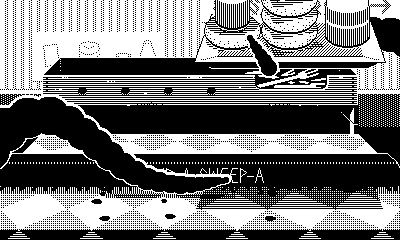
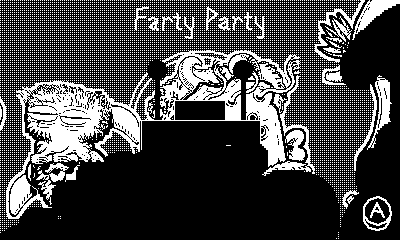
At the door level, this means using the crank to open and shut a little flap in the door to check people out when they approach. If you’re running Cyclops Anger Management, you’re counting eyes, which can be a surprisingly delicate task on Mars, with all these different aliens running around. If you’re running the Non-Blinker Roundtable, you need to watch people to make sure that you only let in the people who never seem to need to close their eyes. There’s a lovely variety, though. For a flinching support group, I had to toot a horn and see who reacted to it. You can guess what I was checking for before the Farty Party.
The door is only a part of it, though. This is a cheerful management and puzzle game that expands in a handful of directions. You choose a support group each night, work out which areas you need to advertise in so the right people learn about it, buy food that you think people will like, and then run everything but the actual group itself. Monitor the door. Let the right people in. Clean up the food station. Make sure everyone’s happy when they leave.
Cash flows through the system, controlling how much you can advertise and what kind of food you can buy, as well as upgrades you can get from a travelling salesman. These can be new support group types, or fancy doodads like a device that allowed me to understand various Martian languages. It’s gentle, though, a game of silly bits and pieces that Pope made in the hope of entertaining his kids. Keep that food table clean, moving stuff around with your tentacles and wiping away crumbs with a special gadget. Keep an eye on whoever’s coming through the door. Notice people, and the things that make them who they are. Try to anticipate their needs and keep them happy.
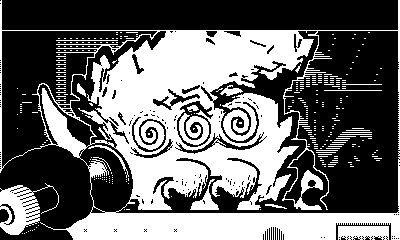
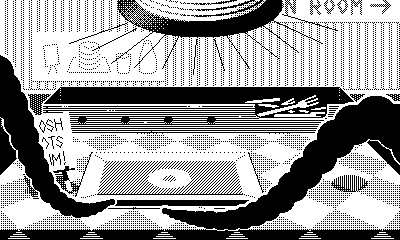
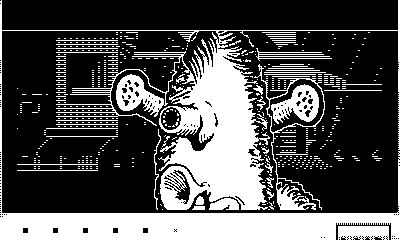
I love all this, and for a handful of reasons. I love that the Playdate means we can see a softer, sillier side to Pope – it’s his preoccupations to a certain degree, but employed to a very different end. And I also love something about it that reminds me of my favourite science fiction novel, and reminds me why it’s my favourite.
Gateway, by Frederik Pohl, may not immediately seem to have a lot in common with Mars After Midnight: it’s a big budget affair about an asteroid that turns out to be a sort of intergalactic bus terminal for a long-gone race of super beings. But what I love about Gateway is its relentless focus on the little human things of life: the struggle to pass time, the junk food, the petty ambitions and indignities of a typical day that just happens to be spent in low-G. Mars After Midnight is like this. It’s a colony on Mars, sure, but it’s also Farty Party, and there are snacks, and probably paper plates, and faces you haven’t seen in a while.
One last thing. It’s community, and that hidden, crucial aspect of community which is groups, volunteers, someone to put out the chairs and lock everything away again. When night falls in Mars, it turns out we’ve brought all this lovely, vital human stuff with us. Mind how you go! Don’t trip on the tentacles. And do pull the shutter down when you’re closing up?
